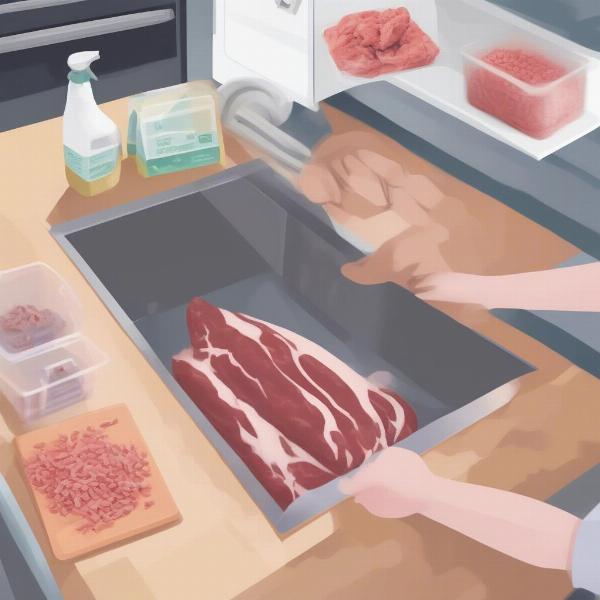Raw dog food is gaining popularity amongst dog owners in Bristol and beyond. But what exactly is it, and is it the right choice for your canine companion? This comprehensive guide will delve into the world of raw dog food in Bristol, covering everything from its benefits and risks to finding reputable suppliers and creating balanced meals.
Understanding Raw Dog Food
Raw dog food, often referred to as the BARF diet (Biologically Appropriate Raw Food or Bones and Raw Food), consists of uncooked meat, bones, organs, vegetables, and fruits. It mimics the diet of wild canines and is often touted for its potential health benefits, such as improved digestion, shinier coat, and increased energy levels. However, it’s crucial to understand both the advantages and disadvantages before making the switch.
Benefits of a Raw Diet
Proponents of raw feeding often cite several potential benefits:
- Improved Digestion: Raw food is often easier for dogs to digest than processed kibble.
- Healthier Skin and Coat: The high nutrient content can lead to a shinier coat and healthier skin.
- Increased Energy Levels: A raw diet can provide sustained energy throughout the day.
- Better Dental Health: Chewing on raw bones can help clean teeth and prevent plaque buildup.
- Weight Management: A balanced raw diet can help maintain a healthy weight.
Risks of a Raw Diet
While raw feeding can offer benefits, it also comes with potential risks:
- Nutritional Imbalances: Creating a balanced raw diet requires careful planning. Imbalances can lead to health problems.
- Bacterial Contamination: Raw meat can contain harmful bacteria like Salmonella and E. coli, posing a risk to both dogs and humans.
- Bone Splinters: Incorrectly sized or type of bones can splinter and cause internal injuries.
- Choking Hazards: Large chunks of food can pose a choking hazard, particularly for smaller breeds.
 Handling Raw Dog Food Safely
Handling Raw Dog Food Safely
Finding Raw Dog Food Suppliers in Bristol
Bristol offers various options for sourcing raw dog food:
- Local Butchers: Many butchers can supply fresh meat suitable for raw feeding.
- Pet Shops: Specialty pet shops often carry pre-made raw food mixes.
- Online Retailers: Several online retailers deliver raw dog food directly to your door.
When choosing a supplier, ensure they prioritize quality, hygiene, and ethically sourced ingredients.
Creating a Balanced Raw Diet
A balanced raw diet typically consists of:
- Muscle Meat: Chicken, beef, lamb, turkey, fish.
- Organ Meat: Liver, kidney, heart.
- Bones: Raw, meaty bones appropriate for the dog’s size and breed.
- Vegetables: Leafy greens, carrots, broccoli, etc.
- Fruits: Apples, berries, bananas (in moderation).
Transitioning to a Raw Diet
If you’re considering switching to raw feeding, it’s essential to transition gradually to avoid digestive upset. Start by mixing a small amount of raw food with your dog’s current food and gradually increase the proportion of raw food over several weeks.
Is Raw Feeding Right for Your Dog?
The decision to feed your dog a raw diet is a personal one. Consult with your veterinarian to discuss your dog’s individual needs and assess whether raw feeding is a suitable choice. They can help you understand the potential benefits and risks and guide you in creating a safe and balanced diet.
Conclusion
Raw dog food in Bristol presents an alternative feeding option for dog owners seeking a more natural diet for their pets. By understanding the benefits, risks, and proper preparation methods, you can make an informed decision about whether raw feeding aligns with your dog’s health and dietary requirements. Remember to always consult with your veterinarian before making any significant changes to your dog’s diet.
FAQ
- Is raw dog food safe for puppies? Yes, puppies can be fed a raw diet, but it’s crucial to ensure it’s nutritionally balanced for their growth stage. Consult your vet for guidance.
- Can I mix raw food with kibble? It’s generally not recommended to mix raw food and kibble in the same meal due to different digestion rates.
- How do I store raw dog food? Store raw dog food in airtight containers in the refrigerator and use it within a few days.
- What if my dog gets sick after eating raw food? Contact your veterinarian immediately if your dog exhibits any signs of illness after consuming raw food.
- Where can I find raw dog food suppliers in Bristol? Local butchers, pet shops, and online retailers are good places to start.
- How much raw food should I feed my dog? The amount of raw food varies depending on your dog’s size, breed, activity level, and age. Consult a veterinarian or a canine nutritionist for personalized guidance.
- Is a raw diet expensive? Raw feeding can be more expensive than kibble, depending on the ingredients and sourcing.
About ILM Dog
ILM Dog is your trusted international resource for all things dog-related. We offer expert advice on dog breeds, health, training, nutrition, grooming, and much more. Our goal is to empower dog owners worldwide with the knowledge and resources to provide the best possible care for their canine companions. For personalized guidance on raw feeding and other dog care inquiries, contact us at [email protected] or +44 20-3965-8624.